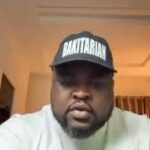Governor Alex Otti Speaks on Nigeria’s Economy, Tinubu’s Policies, and Need for Structural Reform

Abia State Governor Alex Otti, during a candid interview on Arise News, weighed in on Nigeria’s economic direction under President Bola Tinubu, offering cautious assessments while emphasizing the urgent need for structural reforms and economic discipline.
When asked if President Tinubu has performed well economically, Otti declined to give a definitive answer, citing his direct access to the president.
“I have access to him. I can always discuss with him. It would be unfair for me to come in front of the cameras and be assessing him. And today is just 23 months into the administration,” Otti explained.
He was also pressed on whether he had personally voiced concerns to the president regarding specific federal decisions, such as the declaration of a state of emergency in Rivers State. Again, Otti declined to comment, stating firmly:
“I wouldn’t discuss people. I wouldn’t discuss other states. I wouldn’t discuss the federal government.”
However, the governor did not shy away from commenting on the general economic climate. He acknowledged the rising inflation—currently pegged at 24%—and noted the dire predictions from the International Monetary Fund, warning that inflation could hit 37% in the coming years.
“The numbers are gloomy,” Otti admitted. “But did we start sinking today? No. We have been sinking.”
He stood by two of the Tinubu administration’s most controversial economic policies: fuel subsidy removal and the floating of the naira.
According to Otti, the subsidy regime had become unsustainable and was primarily benefiting the wealthy.
“The subsidy removal was long overdue. It was a scam,” he said. “Big men like you and I were the ones benefiting.”
He further explained that floating the naira was a necessary but poorly timed move.
“I had written extensively about it. But the mistake was doing both—removing the subsidy and floating the naira—at the same time. That was not ideal. However, if we stay the course, the economy will rebound.”
Still, Otti acknowledged the current hardships faced by Nigerians.
“It’s very unfortunate. The naira is not worth anything. Inflation is high. People are dying of hunger. But some of the sacrifices must be made. If you don’t make them today, you’ll make them tomorrow—or the economy will go up in flames.”
He stressed the need for Nigeria to boost local production and reduce reliance on imports.
“Part of the problem with the exchange rate is because we are not producing much. We are importing everything—from the profane to the profound. We import toothpicks, we import bottled water. Should we be doing that?”
In conclusion, Otti emphasized that while talk is necessary, decisive action is even more critical.
“We’re just talking. We need to do something about it.”
Governor Otti’s remarks reflect the complexities of navigating economic reform in Nigeria, highlighting both the challenges of leadership and the urgent need for structural change.









